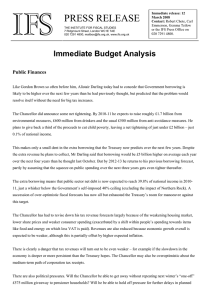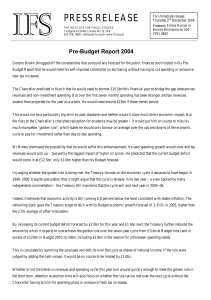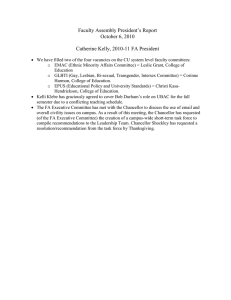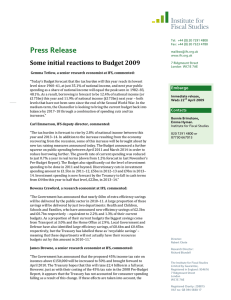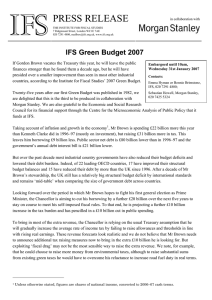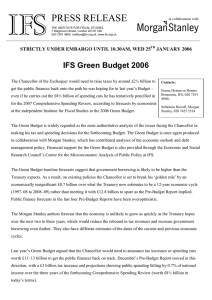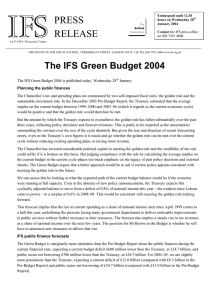IFS PRESS RELEASE
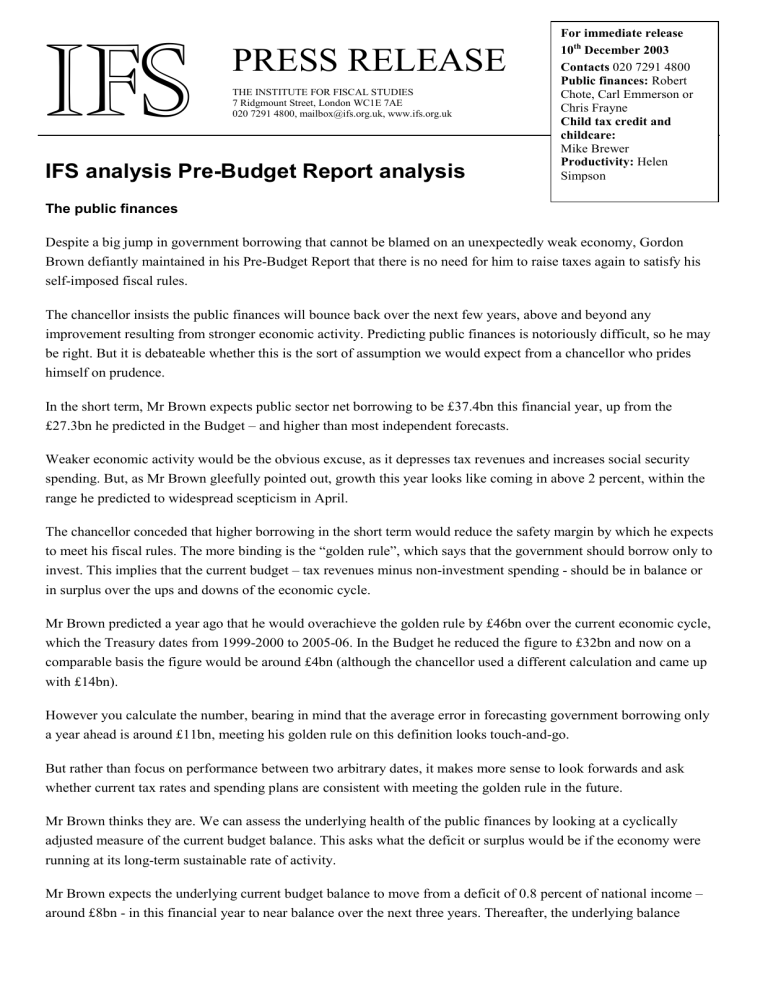
IFS
PRESS RELEASE
THE INSTITUTE FOR FISCAL STUDIES
7 Ridgmount Street, London WC1E 7AE
020 7291 4800, mailbox@ifs.org.uk, www.ifs.org.uk
IFS analysis Pre-Budget Report analysis
The public finances
For immediate release
10 th
December 2003
Contacts 020 7291 4800
Public finances: Robert
Chote, Carl Emmerson or
Chris Frayne
Child tax credit and childcare:
Mike Brewer
Productivity: Helen
Simpson
Despite a big jump in government borrowing that cannot be blamed on an unexpectedly weak economy, Gordon
Brown defiantly maintained in his Pre-Budget Report that there is no need for him to raise taxes again to satisfy his self-imposed fiscal rules.
The chancellor insists the public finances will bounce back over the next few years, above and beyond any improvement resulting from stronger economic activity. Predicting public finances is notoriously difficult, so he may be right. But it is debateable whether this is the sort of assumption we would expect from a chancellor who prides himself on prudence.
In the short term, Mr Brown expects public sector net borrowing to be £37.4bn this financial year, up from the
£27.3bn he predicted in the Budget – and higher than most independent forecasts.
Weaker economic activity would be the obvious excuse, as it depresses tax revenues and increases social security spending. But, as Mr Brown gleefully pointed out, growth this year looks like coming in above 2 percent, within the range he predicted to widespread scepticism in April.
The chancellor conceded that higher borrowing in the short term would reduce the safety margin by which he expects to meet his fiscal rules. The more binding is the “golden rule”, which says that the government should borrow only to invest. This implies that the current budget – tax revenues minus non-investment spending - should be in balance or in surplus over the ups and downs of the economic cycle.
Mr Brown predicted a year ago that he would overachieve the golden rule by £46bn over the current economic cycle, which the Treasury dates from 1999-2000 to 2005-06. In the Budget he reduced the figure to £32bn and now on a comparable basis the figure would be around £4bn (although the chancellor used a different calculation and came up with £14bn).
However you calculate the number, bearing in mind that the average error in forecasting government borrowing only a year ahead is around £11bn, meeting his golden rule on this definition looks touch-and-go.
But rather than focus on performance between two arbitrary dates, it makes more sense to look forwards and ask whether current tax rates and spending plans are consistent with meeting the golden rule in the future.
Mr Brown thinks they are. We can assess the underlying health of the public finances by looking at a cyclically adjusted measure of the current budget balance. This asks what the deficit or surplus would be if the economy were running at its long-term sustainable rate of activity.
Mr Brown expects the underlying current budget balance to move from a deficit of 0.8 percent of national income – around £8bn - in this financial year to near balance over the next three years. Thereafter, the underlying balance
would move to a surplus of 0.6% of national income by 2008-09, roughly the safety margin Mr Brown has sought in the past.
Why the optimism?
On spending, the Chancellor has allocated more resources this year and next to the costs of the UK’s involvement in
Iraq. But he assumes that he will not have to go on making such commitments indefinitely.
Mr Brown also assumes that the tentative departmental spending plans laid out in the last Budget for next summer’s spending review will be maintained in cash terms even though the Treasury now expects inflation in the whole economy to be a little higher over that period.
If Mr Brown sticks to these numbers, the review will be less generous to departments than appeared to be the case at
Budget time. By contrast, the tax revenues used to finance this spending will automatically rise in line with the higher inflation, a net gain for the Exchequer.
The public finances are also projected to strengthen because the Treasury assumes that tax thresholds rise in line with prices rather than earnings. The chancellor has been happy with this in the past, reflected in the fact that the number of higher-rate taxpayers has risen.
Receipts are also expected to rise more quickly than predicted in the Budget in part because of the rise in the stock market since April. This will boost stamp duty on share transactions, capital gains tax and inheritance tax receipts.
The chancellor also announced a range of measures aimed at reducing non-payment of VAT and duty on spirits.
But will the underlying improvement in the public finances be as dramatic as the chancellor suggests? If, as we suspect, he is over-optimistic about the medium term path of tax revenues, then no. If the chancellor wishes to stick with his current spending plans and to meet his fiscal rules with the comfort he has sought in the past, we still suspect that further tax increases will eventually be necessary.
Child tax credit
“The per child element of the child tax credit will rise in April 2004 by £2.50 a week above the increase in line with average earnings growth that has already been promised. This costs the Government £885m. This is marginally less than the cost of the £3 a week increase we estimate would be needed for the Government to be on course to hit its child poverty target in 2004/5, measuring income after housing costs. The government has also saved £240m – and reduced the generosity of the increase - by freezing both the family element of the child tax credit and the income thresholds of the child and working tax credits in April 2004. Overall, the changes will redistribute support from middle- and higher-income families with children to low-income families with children.”
Said Mike Brewer, senior research economist at IFS
2
Childcare tax relief
“The PBR announced a tax exemption for most forms of employer-supported childcare, such as vouchers and workplace nurseries. Fewer than 60,000 employees currently take advantage of such schemes, although the tax exemption should increase their attractiveness, particularly for higher-rate taxpayers. However, at no greater cost to their employer, some low-income parents would be better off taking a higher wage instead of a childcare voucher,
and then claiming the childcare tax credit. Many parents will find it very complicated to calculate under which option they would be better off.”
Said Mike Brewer, senior research economist at IFS
Productivity
The Government intends to launch an initiative aimed at providing equity finance to small businesses. This
“pathfinder” round of new Enterprise Capital Funds was announced alongside potential changes to the existing
Venture Capital Trust and Enterprise Investment Scheme, which provide individuals with generous tax incentives to invest in small businesses.
The new Enterprise Capital Funds will operate alongside the existing Regional Venture Capital Funds, the UK High-
Technology Fund, the University Challenge Fund and the Early Growth Funding programme.
“There are a number of policies aimed at providing this type of finance. It is good that this new scheme is being piloted, as this should tell us whether it offers value for money.”
Said Helen Simpson, productivity and innovation programme director at IFS
The Chancellor also announced an extension of the Employer Training Pilots. This scheme gives incentives to employers to provide basic skills or Level 2 training to their low-qualified employees.
“At this stage we don’t yet know whether this scheme will boost productivity. We are yet to find out if it will raise participants’ future earnings or the performance of the firms they work for.”
Said Helen Simpson, productivity and innovation programme director at IFS
ENDS
Notes to editors:
1. IFS will be holding a briefing on Thursday 11 th December at 12.30 pm at 7 Ridgmount Street, London WC1E 7AE. Please contact
Bonnie Brimstone (boonie_b@ifs.org.uk) if you would like to come.
2. Child tax credit notes: The per child element of the child tax credit will rise by £3.50 a week in April 2004, or £2.50 a week more than the already-announced increase in line with average earnings growth. This will benefit 7.2 million children in low and middle-income families. The upper income threshold, lower income threshold and the family element will all be frozen. This is equivalent to a real cut of 2.8%.
